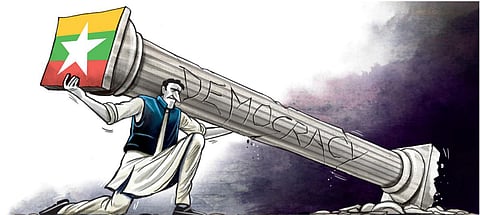

Recently, Gujarat got a new chief minister. So did Punjab. Though both the states were ruled by parties with opposing ideologies, it didn’t affect how the chief ministers were changed. This wasn’t the first time chief ministers were altered by the so-called ‘high command’ of respective parties, nor would it be the last. Theoretically, a chief minister is supposed to represent the people of a particular state. But, in practice, the chief minister has come to represent the interest of the ‘high command’ or party honchos sitting in Delhi.
Democracy is an alien concept to India, despite our claims about ancient panchayat systems. For thousands of years, our scriptures hailed the divinity of the Raja. The medieval Islamic courts of north India that modelled on ancient Persia or Turkey were also based on absolute submission to the Badshah. After Independence, there were heated debates on which form of democracy we should adopt. Our Constitution draws inspiration from both American and British ones, and many argued for a presidential democracy against a parliamentary one.
However, we went with the British model and settled for the parliamentary model. Indians were familiar with constituent assemblies even before Independence, and this might have influenced the decision. It was argued that for a country with mind-boggling diversity as India, a parliament would help representation of all ethnicities and enable political space to various diverse sections of the society. Another argument, which appears laughable now, was that the parliamentary system would prevent authoritarianism. For a country like India, which is yet to shake off the vestiges of feudalism, sycophancy to tyrants and hero-worshipping dictatorial leaders come naturally. A right to vote wasn’t going to stand in the way of Indians deifying their leaders.
Now we have a system with all the disadvantages of either method of democracy or the advantages of neither. It hasn’t prevented the personality cult and hero worship. At the same time, the parliament system has served as a stumbling block to even the supposedly strong leaders to govern. Instead of being answerable to the people, the legislative head is worried about keeping the elected representatives together. As we saw in Punjab, Karnataka or Gujarat recently, a group of MLAs can quickly expel a popular chief minister with the caucus’s support in their party headquarters. In such scenarios, does the legislative represent the will of the people or the whim of the party officials?
The idea that the parliamentary system will represent diversity well has also turned out to be a myth. We have seen that the party that wins most of the seats in the Hindi heartland rules the country, and it doesn’t matter how the other ethnic or geographic areas vote. Even without having a single seat from many states, the ruling party could have a brute majority. The same applies to many states, where a few constituencies in some districts dictate which party would rule. On the other hand, bizarre coalitions have propped up men who were scarcely known beyond their turf before their elevation as prime ministers in the past. All these have given rise to highly sectarian election campaigns and are creating colossal schism in our society. Caste, religious and linguistic parties are flourishing, thanks to such a system, as one can run micro-campaigns catering to each constituency.
Perhaps, it is time to shift to a presidential system at both State and the Union governments level. It is better to accept the reality that Indians tend to hero-worship their leaders. Any politician who aspires to be a national leader would be forced to win the support of people across the country. He wouldn’t be able to outsource communal campaigns to his constituency-level representatives. Doing such a thing at the national level wouldn’t endear him across all cross-sections of a diverse society.
He can’t be elected by catering to only one geography or ethnic group at the cost of others. His challenger would also have to be of equal competence and can’t depend on his family legacy. At the state level, it would end the selling, buying and renting of elected representatives, resort democracy and thrusting new leaders as per the whim of party supremos. Democracy is vital for India, but we can’t be proud of how it is practised now. It is time we should seriously think of changing to a presidential form of government.
mail@asura.co.in